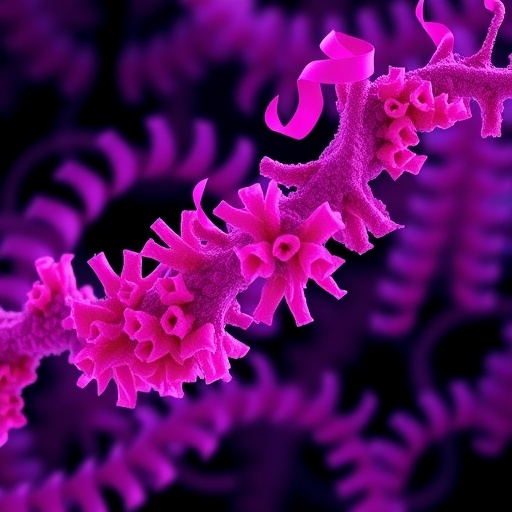In a groundbreaking study set to redefine the landscape of breast cancer research, scientists have unveiled a comprehensive computational analysis of the protein kinase C delta (PKCδ) enzyme, identifying a novel genetic variant with significant implications for breast cancer diagnostics. PKCδ, a prominent member of the protein kinase C (PKC) family within the AGC kinase subgroup, has long been recognized for its pivotal role in regulating diverse cellular mechanisms. Its dysregulation is increasingly implicated in cancer progression, yet the molecular underpinnings driving these effects have remained elusive.
Recent advances enabled researchers to meticulously scrutinize 613 non-synonymous single-nucleotide polymorphisms (nsSNPs) within the PKCδ gene, aiming to pinpoint variants capable of altering the enzyme’s structure and function in ways that predispose cells to malignancy. Non-synonymous variants change amino acids in the protein sequence, often with profound consequences on protein stability and interaction networks. Through a suite of sophisticated in silico tools and computational models incorporating sequence conservation and structural dynamics, this study sheds new light on how subtle genetic alterations may fuel breast cancer pathology.
Among the myriad nsSNPs analyzed, four mutations—V114G, C189R, C189Y, and W608R—stood out as highly oncogenic, disrupting PKCδ’s normal conformational integrity. Molecular dynamics simulations revealed that these substitutions provoke substantial deviations from the protein’s native architecture, increasing flexibility and potentially destabilizing key regions critical for enzymatic activity. Such disruptions are hypothesized to induce aberrant phosphorylation cascades underpinning tumorigenesis.
Of particular interest is the W608R variant, situated within the highly conserved AGC kinase domain, a region essential for PKCδ’s catalytic function. This mutation was shown to markedly distort the protein’s surface topology and alter its net charge, with potent repercussions for intramolecular and intermolecular interactions. Notably, disturbing PKCδ’s engagement with the signal transducer and activator of transcription 3 (STAT3) protein suggests a mechanism by which the variant might activate PKCδ through unconventional pathways, skirting traditional regulatory controls.
The implications of these findings extend beyond structural biology, as the study also established a robust epidemiological link between the W608R variant—denoted by the rs1703863535 SNP—and breast cancer risk. Individuals carrying the TT genotype exhibited an odds ratio (OR) of 2.7 and a relative risk (RR) of 1.6 for developing breast cancer, statistical indicators underscoring the variant’s potential as a biomarker for susceptibility and prognosis. This discovery opens new avenues for personalized medicine, wherein genetic screening could inform early detection and targeted interventions.
Moreover, the methodological framework employed in this research exemplifies the power of integrating computational genomics, structural bioinformatics, and molecular simulations to unravel the complexities of cancer biology. By delineating how specific genetic alterations influence the physical properties and interaction landscapes of crucial enzymes, scientists can better predict oncogenic potential and tailor therapeutic strategies accordingly.
The study further highlights the nuanced role of PKCδ in breast cancer. While overexpression of this kinase has been documented in tumor progression and poor patient outcomes, the precise molecular events enabling such pathogenic behavior were unclear. This investigation bridges that gap, elucidating how particular nsSNPs may confer functional changes that amplify PKCδ’s oncogenic potential, thereby promoting unchecked cell proliferation and metastasis.
Crucially, the research acknowledges the necessity of experimental validation beyond computational predictions. Functional assays in cellular and animal models will be vital to confirm the pathological mechanisms proposed and to explore avenues for pharmacological modulation of these variants. Nonetheless, the computational insights provided form an indispensable foundation on which such translational research can build.
The identification of rs1703863535 as a promising biomarker aligns with ongoing efforts to develop precision oncology tools. Biomarkers that accurately stratify patients based on genetic risk can revolutionize screening programs, enabling earlier interventions and optimizing therapeutic efficacy. This is particularly pertinent for breast cancer, one of the most common and deadly cancers among women worldwide.
Furthermore, understanding the interplay between PKCδ variants and signaling partners like STAT3 reveals potential targets for combination therapies. Inhibiting aberrant kinase activity or disrupting maladaptive protein-protein interactions may mitigate tumor aggressiveness and resistance to conventional treatments. The study’s findings lay groundwork for such innovative approaches.
By deploying computational methodologies capable of handling vast variant datasets, this research demonstrates a scalable pathway to identifying clinically meaningful genetic alterations across other oncogenes and tumor suppressors. The approach may be extrapolated to explore variant-driven disease mechanisms in diverse cancers and beyond.
In summary, this comprehensive analysis of PKCδ nsSNPs uncovers critical insights into the enzyme’s structural and functional perturbations associated with breast cancer. The discovery of the W608R variant’s oncogenic potential and epidemiological relevance accentuates the utility of integrating large-scale computational analyses with molecular biology to propel cancer biomarker discovery.
As researchers continue to unravel the genetic intricacies of cancer, studies such as this underscore the vital intersection of bioinformatics and molecular oncology. They serve as a testament to how cutting-edge computational science can illuminate pathways to personalized medicine and improved patient outcomes in the battle against breast cancer.
Subject of Research:
The study focuses on the identification and characterization of oncogenic non-synonymous single-nucleotide polymorphisms in the PKCδ enzyme and their functional implications in breast cancer pathology.
Article Title:
Comprehensive computational analysis of PKCδ non-synonymous variants identifies rs1703863535 as a potential breast cancer biomarker
Article References:
Zafar, S., Badshah, Y., Shabbir, M. et al. Comprehensive computational analysis of PKCδ non-synonymous variants identifies rs1703863535 as a potential breast cancer biomarker. BMC Cancer 25, 1667 (2025). https://doi.org/10.1186/s12885-025-15194-6
Image Credits:
Scienmag.com




